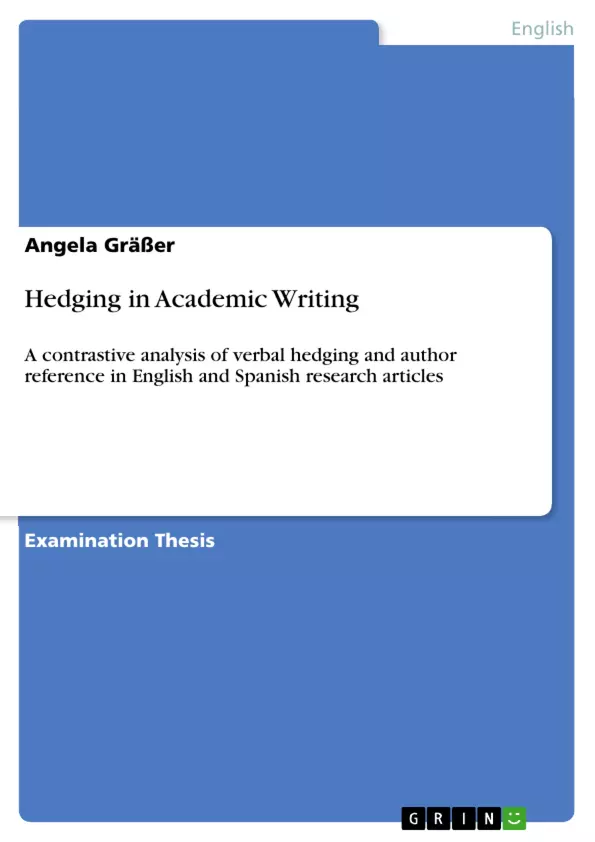Hedging, ein Begriff der jüngeren Sprachwissenschaft, der sich sowohl auf semantisch-kognitive wie pragmatische Mittel und Strategien des Sich-nicht-festlegen-wollens oder -könnens bezieht, wird in der vorliegenden Studie als interpersonale Textstrategie verstanden, die den Restriktionen der, so die These, in den beiden untersuchten Sprachgemeinschaften geltenden tradierten Normen unterliegt. [...] Die thesengeleitete Untersuchung der 10 englischen und 10 spanischen linguistischen Fachaufsätze [...] führen zu erwartbaren, aber auch unerwarteten Ergebnissen. Unterschiede sind vor allem in Bezug auf den Grad der interpersonal-kooperativen Ausrichtung auf den Rezipienten zu konstatieren. Anglophone SchreiberInnen wenden sich häufiger unmittelbar an ihre LeserInnen, indem sie beispielsweise direkter auf sich selber als AutorInnen verweisen, während in den spanischen Texten nicht vorwiegend, aber doch auffällig oft unpersönliche Konstruktionen, einschließlich des pronominalen pluralis modestiae auftreten. Insofern bestätigt sich die eingangs aufgestellte Hypothese, dass AutorInnen dieses Kulturkreises "more conservative" sind. Allerdings, auch das zeigen die empirischen Befunde, ist eine Annäherung an die anglophonen Konventionen des hedging in den spanischen akademischen Publikationen nicht zu übersehen. Vorsichtig, aber sofort einsichtig formuliert die Verfasserin daher abschließend: "[It] may be true that the overwhelming influx of the English language in nearly every realm of academic discourse has indeed altered the conventions in 'academic' Spanish" (S. 41).
(Auszug aus dem Gutachten der Zulassungsarbeit; ausgestellt von Prof. Dr. Wolfram Bublitz)
Table of Contents
- Introduction
- Theoretical Framework
- Approaches to a Definition of Hedging
- Anglophonization vs. Multilingualism in Academic Discourse
- The Importance of Hedging in Academic Writing
- Cross-cultural Research on Hedging
- Hedging Strategies in Academic Writing
- Modal Verbs (1st Category)
- Lexical Verbs (2nd Category)
- Reference to Author and Addressee (3rd category)
- Contrastive Analysis
- Corpus Description
- Methodology
- Results
- Modal Verbs
- Lexical Verbs
- Reference to Author and Addressee
- Some General Observations and Problems
- Conclusion
Objectives and Key Themes
This paper aims to investigate the use of hedging in academic writing, particularly comparing the practices of native English and Spanish speakers. It focuses on the influence of Anglophonization on academic discourse, exploring how the rise of English as a global language impacts the linguistic conventions of other languages used in scholarly publication. The study also examines the interpersonal function of hedging in conveying authorial presence and managing reader-writer relationships.- The role of hedging in academic writing
- The influence of Anglophonization on academic discourse
- The interpersonal function of hedging
- Cross-cultural differences in hedging practices
- The relationship between hedging and authorial presence
Chapter Summaries
The first chapter provides an introduction to the concept of hedging, situating it within the broader context of vagueness in language. It examines the historical development of hedging research, highlighting its shift from spoken to written language, particularly in academic writing. The chapter also discusses the significance of cross-cultural perspectives in understanding hedging practices. The second chapter presents a theoretical framework for the study, focusing on the concept of hedging and its various definitions. The chapter explores the significance of hedging in conveying authorial presence, managing reader-writer relationships, and navigating the complexities of academic discourse. It also delves into the historical development of English as a global language and the impact of Anglophonization on academic writing. The third chapter outlines the methodology and results of a contrastive analysis comparing hedging practices in English and Spanish academic writing. It describes the corpus used for the analysis, the methods employed, and the key findings related to the use of modal verbs, lexical verbs, and referential markers in both languages.Keywords
The main focus of this research paper is on hedging in academic writing. The text explores cross-cultural differences in hedging practices, particularly between English and Spanish. Other key concepts include Anglophonization, authorial presence, reader-writer relationships, and the influence of cultural background on linguistic conventions. The study also draws upon concepts from pragmatics, sociolinguistics, and corpus linguistics.Frequently Asked Questions
What is hedging in academic writing?
Hedging refers to linguistic strategies used by authors to express caution, hesitation, or to avoid making over-generalized statements in scholarly texts.
How does hedging differ between English and Spanish academic texts?
Anglophone writers tend to address readers more directly and use more authorial presence, while Spanish writers often use more impersonal constructions, though this is changing due to "Anglophonization."
What is Anglophonization in academic discourse?
Anglophonization describes the increasing influence of the English language and its rhetorical conventions on other languages used in global academic publishing.
What are the main categories of hedging strategies mentioned?
The study categorizes hedging into modal verbs, lexical verbs, and references to the author and addressee.
Why is hedging important for authorial presence?
It helps authors manage reader-writer relationships by softening claims and creating a space for professional negotiation and politeness.
- Quote paper
- Angela Gräßer (Author), 2013, Hedging in Academic Writing, Munich, GRIN Verlag, https://www.grin.com/document/268344



